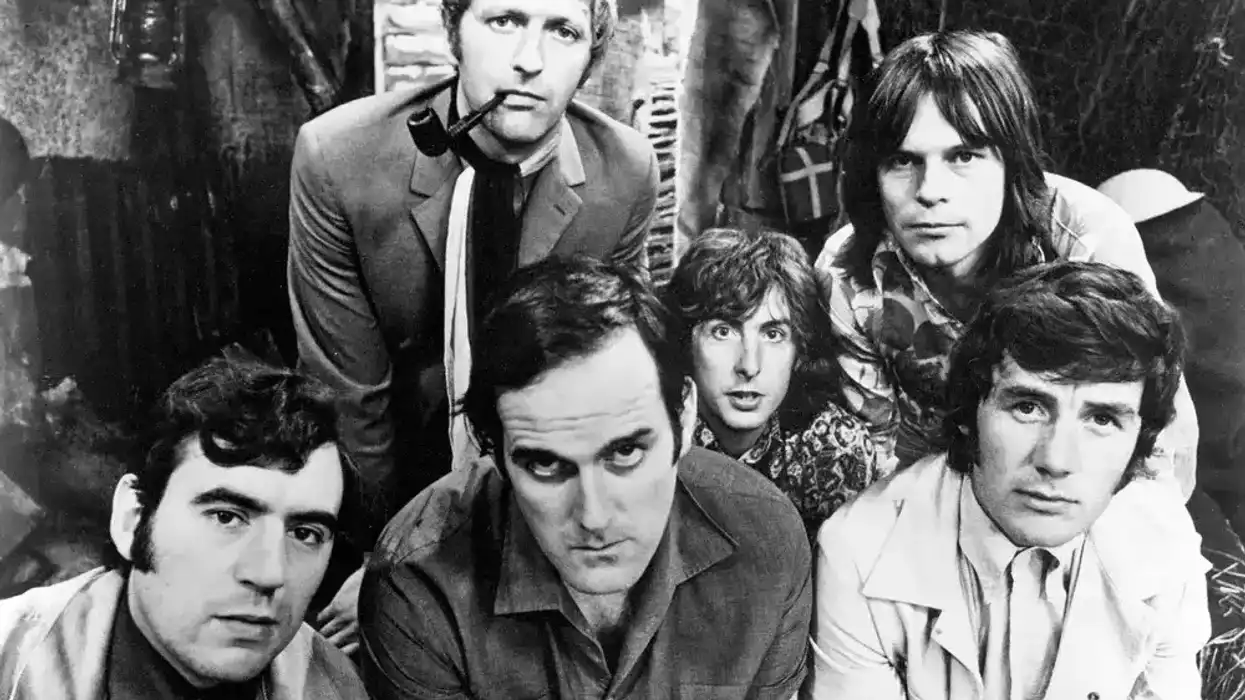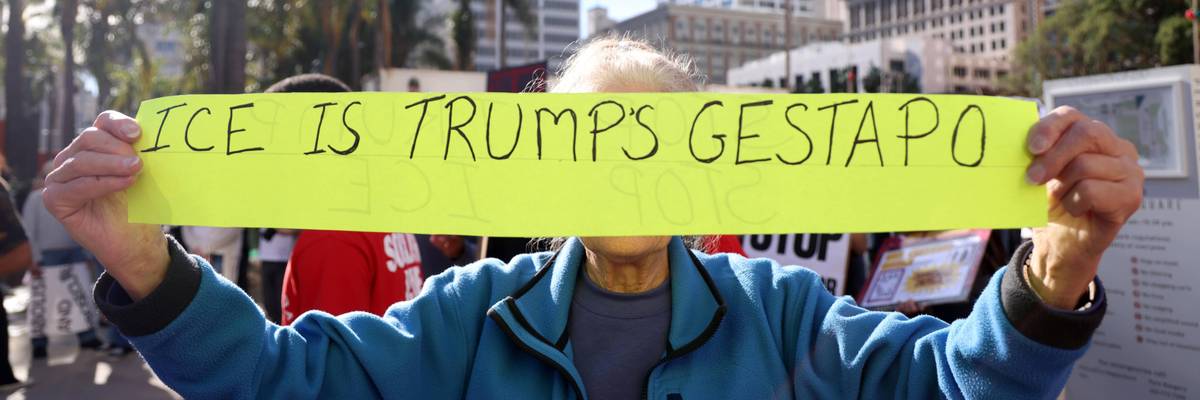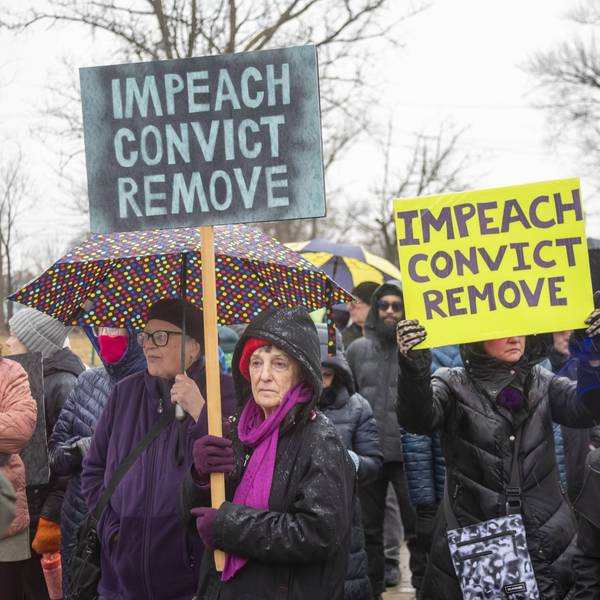Donald Trump is taking his demented dreams to a new level in his quest to take over Greenland. The man who whined over not getting a Nobel Prize and then followed Hitler propagandist Joseph Goebbels lead in accepting a prize awarded to someone else, has now decided he wants Greenland.
Trump is now proposing to whack us with a $75 billion tax increase to put pressure on Denmark and the rest of the EU to give him Greenland. If you missed Trump’s plans to hit us with this tax hike it’s because of the consistently awful reporting we get from major media outlets.
They reported on the tariffs Trump is imposing on the European countries most visible in resisting U.S. pressure to take Greenland. The problem with the reporting is that it implies the European countries pay the tariffs. They don’t, we do.
This is not a debatable point; the data are very clear. Well over 90 percent of the cost of a Trump tariff is borne by consumers or importers in the United States, not by the exporting countries. When Trump starts yelling “tariff, tariff, tariff,” he is yelling “tax, tax, tax,” and we’re the ones paying it. And $75 billion is not trivial. It’s one percent of the budget, more than twice the cost of the enhanced premiums for Obamacare policies that Trump says we can’t afford.
Let’s be clear, Trump wants Greenland because it is big. And he almost certainly thinks Greenland is far bigger than it actually is because he doesn’t understand that the Mercator projection maps, which are standard ones we all use, hugely exaggerate the size of areas near the poles.
No one likes the idea that the United States is being run by a moron.
We all know Trump says that he needs Greenland for national security. This argument is not worth a second’s consideration. Greenland and Denmark are both members of NATO. If he felt there was some need for putting additional military assets in or around Denmark, all he has to do is ask.
In fact, there were many more United States military installations in Denmark during the Cold War. We removed them after the collapse of the Soviet Union.
Trump’s team themselves made it clear that Greenland is not a national security issue. The country is not even mentioned once in Trump’s National Security Strategy plan that was crafted just two months ago.
Trump effectively admitted this in an interview with the New York Times earlier this month. He acknowledged that he could address any security issues through negotiation with Greenland, Denmark, and the rest of NATO, but said Trump said that he would feel better “psychologically” taking over Greenland.
He compared it to the difference between owning and renting. Insofar as Trump feels a psychological need to own territory that is something that is best addressed through therapy, not military action against allies.
The other argument is that Greenland is rich in rare earth minerals, which Trump’s rich buddies are anxious to exploit. This is popular among people who want to highlight both Trump’s venality and also find rationality in what seems to be an otherwise crazy quest.
While no one should ever underestimate Trump’s corruption, the story doesn’t make any sense. First, it’s not clear that there is big money to be made on Greenland’s rare earth minerals. It is a remote area with little infrastructure. It will be extremely expensive to reach these minerals and would almost certainly take many years. Given developments in technology, it’s not even clear these minerals will still be of much value at the point anyone is able to bring them to the market.
But what’s even more damning for this line of argument is that they could start mining in Greenland tomorrow, if they think it would be profitable. Greenland is very open to foreign investment. If they think there is big money to be made by mining Greenland’s minerals, they would be doing it already.
Trump’s rich friends are undoubtedly pushing for him to take Greenland, he’ll probably give them better deals than Greenland would. Most importantly he will likely get rid of environmental regulations that Greenland’s government would demand.
But the cost of environmental regulations is not likely to be the sort of thing that would warrant a military invasion. Also, it probably is not a good sell to the people of Greenland that Trump wants to take away their ability to protect their environment.
At the end of the day, we really can’t escape the basic story, Trump wants Greenland because it is big. No one likes the idea that the United States is being run by a moron. And it’s painful for those of us left of center to acknowledge that this is who we losing to, not some evil genius. However, that happens to be the reality, and we need to recognize it.

(BBC)
When he doesn’t get the peace prize, he says he’s no longer interested in peace and decides to take over Greenland. When Greenland refuses him, and Denmark and the rest of Europe make a fuss, he goes into a rage, raises tariffs on Europe (which cost Americans dearly), and threatens war on NATO. The president of Russia is delighted.
Can’t you see it? Eric Idle plays the American president — full of himself and utterly off his rocker. John Cleese is the vicious and hapless Latin American president who’s abducted. Terry Gilliam is the baffled, incredulous head of Greenland. Terry Jones plays the righteous leader of Denmark, Graham Chapman a perplexed NATO dignitary, and Michael Palin the wacky but triumphant president of Russia.
The Monty Python team was so funny because they came up with completely absurd situations, handled them with deadpan seriousness, and stretched them to the limits.
But this particular absurd situation isn’t funny. It’s actually happening. And Trump is truly, tragically, frighteningly out of his mind.
Robert Reich is a professor of public policy at Berkeley and former secretary of labor. His writings can be found at https://robertreich.substack.com/
How did we get to this point? The answer is clear.

Hundreds participate in a protest rally in Pershing Square on Saturday against the Trump administration’s incursion into Venezuela and recent ICE shootings in Minneapolis and Portland in downtown Los Angeles on January 10, 2026.
(Photo: Genaro Molina/Los Angeles Times via Getty Images)
James Zogby
Jan 19, 2026
How did we get to the point where the president can say and do things that put our culture and democracy at risk, and it’s just shrugged off as if it were normal?
In social media posts and unscripted press comments he uses language that would have been unimaginable coming from a president in any other period of American history. In just the past few months, Mr. Trump: was photographed making an obscene gesture and mouthing a vulgarity at a demonstrator; demeaned a popular TV personality who had just been murdered; called a Somali American member of Congress garbage, adding that all Somalis were garbage; called the Governor of Minnesota “retarded,” an especially hurtful slur as that governor has a son with a disability; and insulted women reporters who asked him challenging questions, calling them “ugly,” “obnoxious,” and “stupid.”
Parents wouldn’t tolerate this from their children and yet here we have a president of the United States demeaning his office by speaking in such a deplorable manner.
It’s not just the president’s speech that has been so “unpresidential.” Mr. Trump’s need to gratify his ego has led him to make exaggerated false claims about his grievances and his successes. He claims that he has been attacked by media, Congress, and law enforcement agencies like no other president in history. At the same time, he boasts that he has improved the economy and made our cities safer than they have ever been. None of this is true.
In an effort to impose his will and worldview, he has surrounded himself with White House staff and Cabinet that not only heap praise upon him and carry out his every whim, but also support his efforts to silence and intimidate those whom he has denounced as critics.
Herein lies a fundamental difference between President Trump’s first and second terms. In the former, some senior members of his staff and Cabinet served as a check on his behavior. Many were fired and replaced. He began his second term with a detailed plan to transform government, and with a more compliant senior leadership (e.g., the Department of Justice and FBI are willing to order investigations of his critics).
This combination of unchecked power, the president’s need to have his every ambition fulfilled, and his disrespect for law and precedent has led to actions that are illegal. In the first few months, his administration put in place a program to remove over 300,000 government employees. He shuttered USAID, the Voice of America, and the US Institute for Peace—all illegal actions as these were congressionally created and funded entities. He later reopened the Institute for Peace as the Trump Institute for Peace; renamed the nation’s premier center for the arts The Donald J Trump, The John F Kennedy Center for the Performing Arts without any authorization; and had the White House’s East Wing torn down to be replaced by another vanity project—a massive ballroom—which no doubt will also bear his name in the near future.

58% of Americans—Across Political Spectrum—Say 2025 Was a ‘Failure’ Under Trump
Conceivably the most dangerous of President Trump’s moves have been the dramatic expansion of ICE—the immigration enforcement entity—and its unleashing in US cities, posing a direct threat to American democracy.
In recent weeks Mr. Trump sent a massive contingent of ICE agents to Minneapolis, Minnesota ostensibly to root out illegal immigrants, while attempting to embarrass that state’s Democratic governor and to target one of Mr. Trump’s new favorites, Minnesota’s large Somali community. As expected, ICE’s arrests have been indiscriminate, detaining many legal residents and citizens, and their behavior unacceptably brutal. As seen in other cities, ICE behaviors have provoked widespread protests. In one horrifying incident, a member of an observer team monitoring ICE behavior was shot and killed through an open car window by an ICE agent.
The shooting was filmed from multiple angles, establishing that the victim posed no threat to the ICE agent. That didn’t stop the president and other administration officials from propagating a lie about what had transpired. They called the murdered woman a domestic terrorist, saying she’d threatened the life of the ICE shooter. Unwrapping this murder is instructive on many levels.
First, with the enormous budget appropriated for ICE expansion, that entity now has over 10,000 armed agents. The rapidity of its growth has led to inadequate vetting and training. More dangerous still is how ICE has recruited agents: at gun shows and right-wing events, and targeted advertisements on right-wing radio shows. The White House appears to be forming an ideologically cohesive national police force that is anti-immigrant and violence-prone and has been told by the administration that they can act with impunity.
This incident also points out the extent to which the White House is capable of fabricating a storyline that will be echoed by other leaders and their supportive media outlets. The impact is clear. A recent poll showed that, by a wide margin, most Americans believe that the woman’s killing was wrong, but more than three-quarters of Republicans believe the president’s narrative that the murdered woman was a threat to the ICE agent and her killing was justified.
So, how did we get to this point? The answer is clear. A president who says whatever he needs to say to justify his position, officials around him and a supportive media who vociferously agree with him and threaten those who disagree, and a cult-like movement of partisans who will believe what they are told even when the facts speak to a different reality.
Our work is licensed under Creative Commons (CC BY-NC-ND 3.0). Feel free to republish and share widely.
James Zogby
Dr. James J. Zogby is the author of Arab Voices (2010) and the founder and president of the Arab American Institute (AAI), a Washington, D.C.-based organization which serves as the political and policy research arm of the Arab American community. Since 1985, Dr. Zogby and AAI have led Arab American efforts to secure political empowerment in the U.S. Through voter registration, education and mobilization, AAI has moved Arab Americans into the political mainstream. Dr. Zogby has also been personally active in U.S. politics for many years; in 1984 and 1988 he served as Deputy Campaign manager and Senior Advisor to the Jesse Jackson Presidential campaign. In 1988, he led the first ever debate on Palestinian statehood at that year's Democratic convention in Atlanta, GA. In 2000, 2008, and 2016 he served as an advisor to the Gore, Obama, and Sanders presidential campaigns.
Full Bio >



Nice article! Lays bare the base nature of Trump. The man has little regard for anything but his absurd desire to be perceived by humanity as the most powerful and proficient political figure of all time. Why any American citizen supports him or any US military person will work for him escapes me entirely. If we Americans allow Trump to remain in office and lead America for the next three years, then there will not be a new world order, only world chaos… and lots of human suffering resulting therefrom. Many of us Americans, including me, will certainly do all we can do legally to try take all political power from Trump and his like-minded associates.